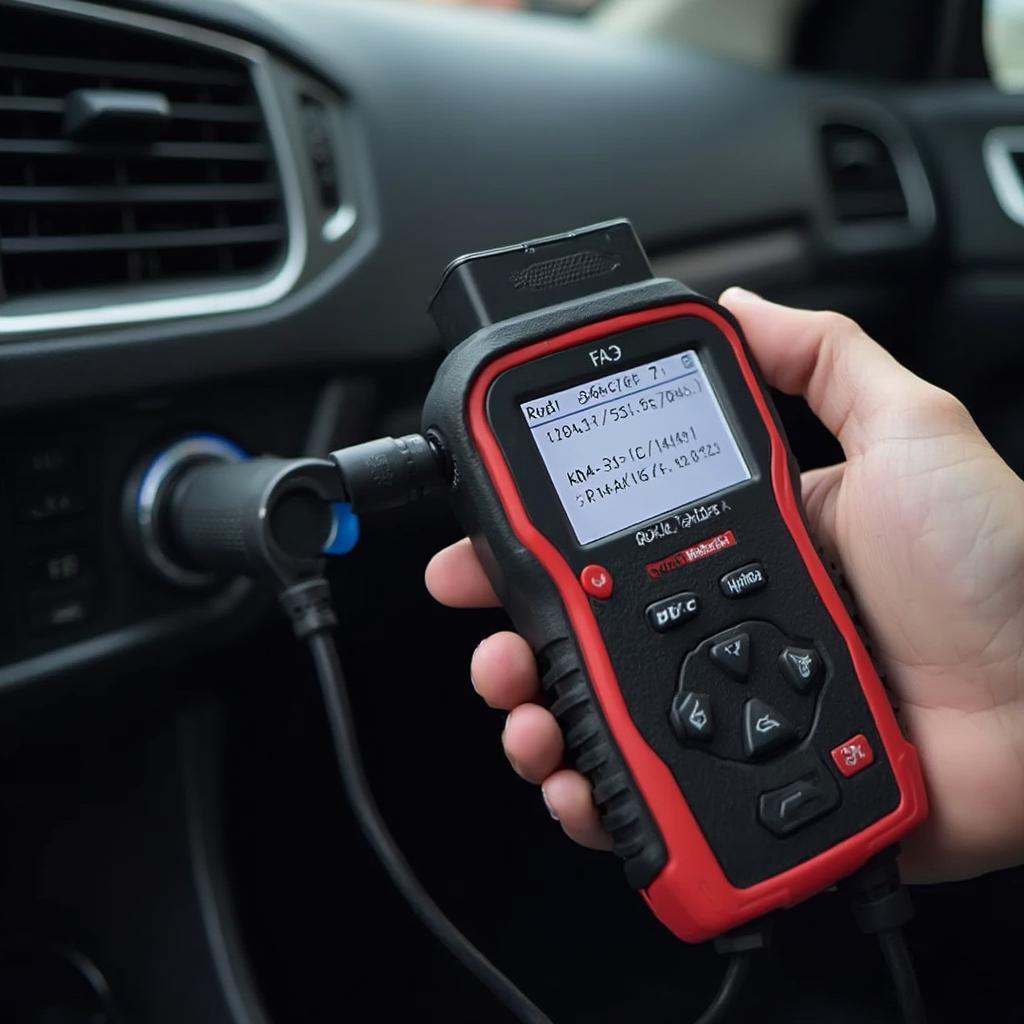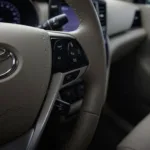Understanding the difference between an OBD2 code reader and an OBD2 scanner can be confusing, especially with all the technical jargon thrown around. Both devices plug into your car’s OBD2 port and provide information about your vehicle’s health, but they differ in their capabilities and ultimately, their purpose. This article aims to demystify the “OBD2 code reader vs. scanner” debate, equipping you with the knowledge to make an informed decision for your vehicle needs.
Decoding the Jargon: OBD2 Code Readers Explained
An OBD2 code reader is a basic, entry-level device designed to read and clear diagnostic trouble codes (DTCs), also known as “check engine” lights. Imagine it as a simplified window into your car’s computer system, providing a basic understanding of potential issues.
 OBD2 Code Reader
OBD2 Code Reader
Here’s what you can expect from most OBD2 code readers:
- Read and display DTCs: This is their primary function. They retrieve and show the error code triggering the check engine light.
- Clear DTCs: After addressing the underlying issue, a code reader can erase the DTC and turn off the check engine light.
- Basic code definitions: Some code readers provide brief explanations of common DTCs, offering a starting point for troubleshooting.
However, OBD2 code readers have limitations:
- Limited data access: They typically only access engine-related data, neglecting other systems like ABS or airbags.
- No live data streaming: They can’t display real-time sensor data, limiting their diagnostic potential.
- Lack of advanced features: You won’t find bi-directional controls, adaptations, or coding capabilities in a basic code reader.
Unveiling the Power: OBD2 Scanners Deep Dive
An OBD2 scanner, often called a scan tool, goes above and beyond the basic functionality of a code reader. It’s a comprehensive diagnostic tool offering a deeper understanding of your vehicle’s systems and their performance. If a code reader provides a glimpse into your car’s health, a scanner offers a thorough checkup.
Here’s where OBD2 scanners excel:
- Comprehensive system coverage: Access and diagnose a wider range of vehicle systems, including engine, transmission, ABS, airbags, and more.
- Live data streaming: View real-time sensor data, allowing you to monitor engine performance, emissions, and other crucial parameters.
- Advanced diagnostics: Perform tasks like bi-directional control (activating components like fuel injectors), adaptations (resetting system parameters), and even coding (modifying vehicle configurations).
- Enhanced data logging: Record data over time to identify intermittent issues or monitor long-term performance trends.
Code Reader vs. Scanner: Choosing the Right Tool
The choice between an OBD2 code reader and a scanner boils down to your needs and expertise.
Consider a code reader if:
- You’re a car owner looking to troubleshoot basic check engine lights.
- You need a simple tool to clear codes after minor repairs.
- You’re on a tight budget and prioritize basic functionality.
Opt for an OBD2 scanner if:
- You’re a DIY enthusiast who enjoys in-depth vehicle diagnostics.
- You need to diagnose complex issues beyond engine codes.
- You want access to advanced features like live data and bi-directional control.
- You’re a professional mechanic requiring a comprehensive diagnostic tool.
Beyond the Basics: Exploring OBD2 Software and Apps
The world of OBD2 diagnostics extends beyond standalone devices. OBD2 software and apps, often paired with Bluetooth or Wi-Fi adapters, offer an alternative way to access your vehicle’s data. These software solutions provide a range of features, from basic code reading to advanced diagnostics, right on your smartphone, tablet, or laptop.
For example, the Torque app OBD2 ELM WiFi Bluetooth offers powerful customization and data logging capabilities when paired with a compatible OBD2 adapter.
Making the Right Choice for Your Needs
Selecting the right OBD2 diagnostic tool depends on your budget, technical expertise, and desired functionality. A basic OBD2 phone charger with integrated code reading capabilities might suffice for casual users, while professional mechanics might require a high-end scanner with extensive diagnostic capabilities.
Remember to research and compare different models, considering factors like:
- Vehicle compatibility: Ensure the tool supports your car’s make, model, and year.
- Software updates: Regular updates are crucial for staying current with new vehicle models and diagnostic protocols.
- User interface: A clear and intuitive interface enhances usability.
- Customer support: Reliable customer support can be invaluable when encountering technical difficulties.
Ultimately, the best OBD2 tool is the one that best meets your individual needs and empowers you to take control of your vehicle’s health.
FAQs
1. Can I use an OBD2 code reader on any car?
OBD2 code readers are designed for vehicles manufactured after 1996 in the United States and after 2001 in Europe. However, certain protocols and connectors might vary between manufacturers, so it’s crucial to check for compatibility before purchasing.
2. Are OBD2 scanners difficult to use?
OBD2 scanners vary in complexity, but many offer user-friendly interfaces and guided functions. Basic tasks like reading and clearing codes are generally straightforward, while advanced features might require some technical knowledge.
3. Do I need a professional mechanic to use an OBD2 scanner?
While professional mechanics utilize high-end scanners, many consumer-grade scanners are designed for DIY enthusiasts. With some research and understanding of your vehicle’s systems, you can perform many diagnostic tasks yourself.
4. Can an OBD2 scanner fix my car’s problems?
OBD2 scanners are diagnostic tools, not repair solutions. They help you identify the root cause of issues, allowing you or a mechanic to perform the necessary repairs.
5. What are some other helpful resources for OBD2 diagnostics?
Online forums, manufacturer websites, and dedicated automotive websites like OBDFree offer valuable information on OBD2 codes, diagnostic procedures, and specific vehicle issues.
Need Further Assistance?
Choosing the right OBD2 tool can be overwhelming. If you need help deciding or have any questions, our team of car diagnostic experts is here to assist you. Contact us via WhatsApp at +1(641)206-8880 or email us at [email protected]. We offer 24/7 customer support to guide you through the process.
Remember, knowledge is power when it comes to your car’s health. Empower yourself with the right tools and information to make informed decisions about your vehicle maintenance.
